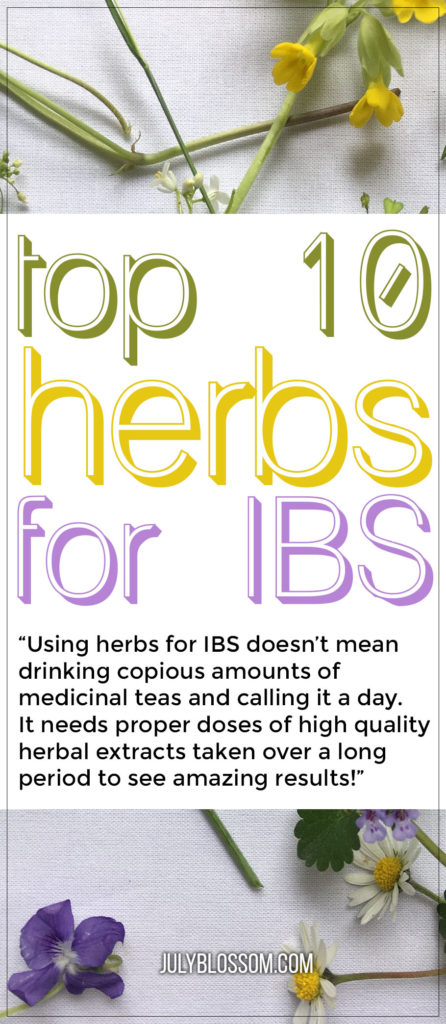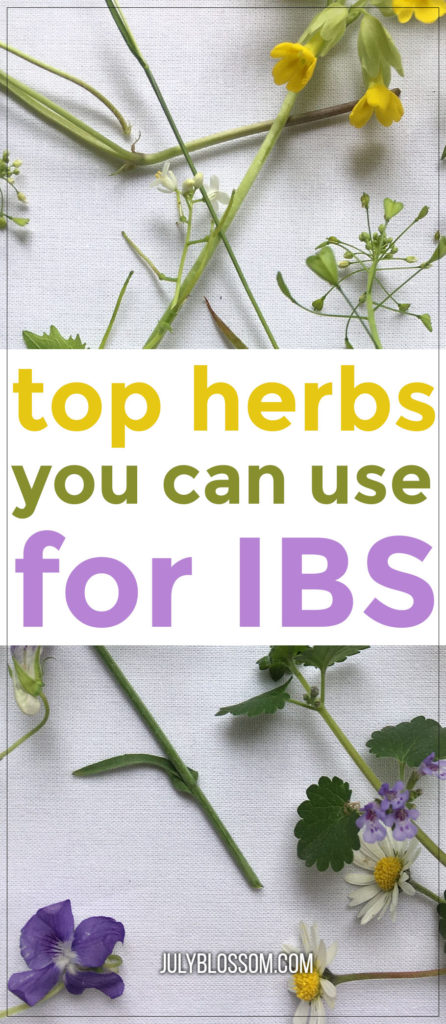Using herbs for IBS doesn’t mean drinking copious amounts of medicinal tea and calling it a day. It needs proper doses of high-quality herbal extracts taken, usually in supplement form, over a long period of time to see amazing results!
When I say over a long period of time, I mean taking the herbs consistently for at least one month. Most of these herbs are strong and you must take them the right way so you can begin to feel better. As always with any medicine, consistency is the key.
Here are some of the top 10 herbs for irritable bowel syndrome. The good thing with herbs is that they help ease IBS symptoms safely with no side effects that conventional drugs can bring up.
List of Top 10 Herbs for IBS
Note: As usual, please first consult your doctor before taking the herbal remedies below, because much as they are safe and have no side effects, they are potent and may interfere with conventional drugs.

1. Peppermint Oil
- Scientific name: Mentha x piperita
Many of us with IBS love rubbing peppermint oil on our bellies for that oh so soothing relief.
But did you know that it can also be taken internally in supplement form? Yes, you can take peppermint tea but enteric-coated peppermint oil capsules offer a stronger effect for banishing IBS symptoms like stomach pain, heart burn, gas, digestive spasms and more.
According to this 2012 study published in The World Journal of Gastroenterology, taking a capsule of peppermint oil helped improve IBS symptoms such as reducing the severity of abdominal pain, abdominal distension, stool frequency and flatulence.
The study also stated that no significant adverse reaction was reported from taking the peppermint oil capsule.
Remember, choose enteric-coated peppermint oil capsules. The coating keeps your stomach from breaking down the capsules so that they don’t dissolve before they get into the intestine and cause heartburn.
2. Turmeric
- Scientific name: Curcuma longa
A yellow golden spice now well-known for its health benefits, turmeric is another powerful herb for IBS.
A 2004 study showed that an 8-week treatment of IBS patients who took two tablets of turmeric extract a day, had decreased IBS prevalence. Their abdominal pain/discomfort score also decreased significantly between baseline and after treatment.
Taking turmeric supplements also showed significant improvements in symptoms after treatment.
Turmeric, or curcuma longa, extract is an effective herb for IBS because of its bactericidal, anti-inflammatory and spasmolytic activities.
3. Artichoke
- Scientific name: Cynara scolymus
This study showed that artichoke extract demonstrated to have both preventive and curative roles in IBS.
The leaf extract administered to IBS patients for 6 weeks showed a significant reduction in the severity of IBS symptoms. 96% of patients rated artichoke extract as being better than or equivalent to previous therapies used for their symptoms.
Also, the tolerability of artichoke extract in the IBS patients was very good.
Artichoke extract was also reported to affect intestinal microbiota and have antispasmodic activity, which can help with digestive spasms and cramps.
4. Psyllium
- Scientific name: Phantago psyllium
Psyllium is rich in soluble fiber which is good for those with constipation dominant IBS.
A study carried out to find the efficacy of the seed from plantago psyllium in IBS patients was determined.
During the first and second months of treatment, the proportion of responders in the plantago group were significantly greater than in the placebo group.
After three months of treatment, IBS patients in the plantago group had a 90% reduction in symptom severity while the placebo group has a 49% reduction.
While taking psyllium supplements for IBS, ensure to also drink a lot of water to help the fiber move along and bind to the wastes.
5. Ginger
- Scientific name: Zingiber officinale
This spicy root has a lot to offer when it comes to quelling digestive troubles. It is one of the popular herbs for IBS natural treatments as it is widely available and easy to use. Many people take ginger tea, which I personally find to be effective in healing.
Ginger is effective for IBS diarrhea, IBS constipation, bloating, flatulence, gas, abdominal pain, digestive spasms, nausea, vomiting and more.
Research shows that ginger may be useful in reducing both pain and stool changes in IBS patients. It is also a broad spectrum and is effective in treating nausea and vomiting
As for what dosage of ginger to take for IBS, the maximum dose is no more than 4 grams per day. Start with 1 gram of ginger then work your way up from there.
I suggest taking ginger capsules so you don’t have to measure out grams of ginger powder every day. You can also try Heather’s Peppermint Ginger & Fennel Capsules.
Other Great Herbs for IBS:
6. Fumitory
- Scientific name: Fumaria officinalis
Fumitory, also known as the common fumitory, drug fumitory or earth smoke, is not exactly a well-known herb. However, research has shown that it is useful for treating IBS symptoms so it’s very much worth a shot.
The herb fumitory is extracted from the dried or fresh flowering plant Fumaria officinalis. It is used in herbal medicine as an ingredient of preparations used mainly for gastrointestinal and biliary-tract disorders.
This study investigated the efficacy of fumaria officinalis in IBS patients, because of its antispasmodic activity.
The results of the study demonstrated that IBS-related pain decreased more in the fumitory group than the placebo group.
Taking fumitory as an herbal remedy for IBS is particularly good for those who suffer from IBS symptoms of abdominal pain, digestive spasms and acid reflux.
It can be found in tincture form. All you have to do is take a dropperful of fumitory tincture in 4 tbsp of aloe vera juice, mix well and take it 15-30 minutes before a meal.
7. Arrow Root
- Scientific name: Maranta arundinacea
Maybe you’ve heard of arrow root powder before? Arrow root is a good natural thickening agent. It is used in food processing but often replaced with cheaper starches such as corn starch, potato starch and rice starch.
Arrow root is also used as a medicine. It is an old fashioned remedy for diarrhea and has been used for treatment of long term disorders of the large intestines that causes abdominal pain, painful gums, IBS and other gastrointestinal disorders.
This piece of research was used to study to assess its efficacy as a treatment for diarrhoea in 11 patients, all of whom had IBS- diarrhea. They were given 10ml of arrow root powder 3 times a day for a month.
The results showed that arrowroot reduced diarrhoea and had a long-term effect on constipation. It also eased abdominal pain. It’s anti-diarrhea action happens due to the fact that it helps increase faecal bulk making bowel movements more efficient.
A more recent study showed that arrow root powder was an effective remedy for diarrhea predominant IBS. It also concluded that it reduced abdominal pain as well.
To take arrow root powder, it should be mixed with a liquid such as water. You can take 2 teaspoons of arrow root powder mixed in water about 20 minutes before your meal.
8. Licorice
- Scientific name: Glycyrrhiza glabra
“Licorice, you mean the candy?!”
Hehe…not exactly the candy because it has only a small amount of licorice extract.
Licorice root has long been used to flavour and sweeten candy and drinks but it is also a digestive aid and an ingredient in medicinal preparations.
Take deglycyrrhizinated licorice (DGL) root extract for IBS. It helps heal the digestive tract by soothing mucosal membranes and increasing the body’s mucus-producing cells in the gastrointestinal lining.
It aids in digestion as well as helps fight inflammation in the GI tract. DGL also kills pathogens and cleanses the colon.
You can take DGL when you have flare-ups. It is available over the counter and you can get it as chewable gummies or pills (if you don’t want to chew) taken a few minutes before a meal. Expect to have better digestion as well as relief from muscle cramps and acid reflux!
9. Fennel
- Scientific name: Foeniculum vulgare
Fennel is a great herb for digestive issues. It is amazing for relieving bloating, gas, constipation, colic and IBS.
Research showed that using fennel essential oil reduced abdominal pain and improved quality of life in IBS patients. But the essential oil is for external use.
IBS patients can consume fennel tea to help relieve IBS problems. Do this by crushing 2 tsp of fennel seeds in a mortar using a pestle then steeping them in boiling water for 10 minutes. Sip after meals for relief.
Fennel teabags are also available and you can even find them in capsule form.
Note: Since fennel seeds are high in FODMAPs (short-chain carbohydrates that can worsen IBS), don’t take a lot of it. It won’t do harm when taken in tea form but if you are considering higher doses, then speak to your doctor first before adding it to your diet plan.
10. Chamomile
- Scientific name: Maticaria chamomilia or Matricaria recutita
Last but not least on this list of medicinal herbs for IBS is chamomile. There are two varieties, roman chamomile (Maticaria chamomilia) and German chamomile (Matricaria recutita). Both work effectively for IBS.
Chamomile is a relaxing herb that aids digestion. Many of us take it as a tea to help manage IBS symptoms, anxiety and insomnia.
A 2010 study showed that the anti-inflammatory properties of chamomile can help relieve muscle spasms associated with intestinal disorders. It has antispasmodic properties that help relax the stomach muscles and smooth walls of the GI tract.
Another study conducted in 2015 found that IBS symptoms of bloating, abdominal pain, stool consistency and defecation difficulties in patients were significantly reduced after using chamomile, even two weeks after the remedy was discontinued.
The treatment used was chamomile extract drops two times a day, 10 drops in the morning and 10 drops at night in a glass of warm water, 15 minutes after meal with a minimum of 12 hours’ time interval.
I need to mention that taking chamomile is also excellent for reducing anxiety and depression that IBS sufferers face every day because of their symptoms.
You can find chamomile capsules as well as chamomile tincture available on Amazon.
Note: Just like fennel, chamomile also contains FODMAPs but it definitely does provide relief in many IBS patients.

You have reached the end of the article, ‘What Herbs are Good for Irritable Bowel Syndrome?’ I truly hope you find this information useful in your IBS healing journey! Thanks for reading.










Leave a Reply